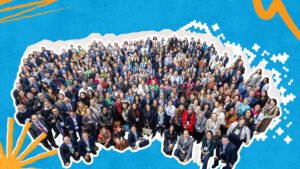
Open Gov Week 2025
This Open Gov Week, we are coming together to celebrate, inspire, and energize the movement
Submit your boldest ideas to the Open Gov Challenge Awards by May 31—celebrating global efforts to advance open government and strengthen democracy.
Learn moreIn OGP, governments work with civil society to create action plans with concrete reforms. This model helps ensure citizens play a role in shaping and overseeing government.
Learn moreOGP members address issues, such as justice, gender, health, education, digital governance, the right to information, civic space, natural resources, corruption and more.
ExploreMore than 70 countries and a growing number of local governments—representing more than two billion people—and thousands of civil society organizations are members of OGP.
Browse membersAccess OGP documents to find information on our approach to open government and our organization.
Meet the OGP team, including our staff and steering committee members, board of directors and ambassadors and envoys.
Connect to OGP news, reports, events and more.
Learn about how OGP is supported by members governments, philanthropic foundations, global development agencies and partners.
Click here for more information about the Open Government Partnership's terms of use.
Terms & Conditions Close